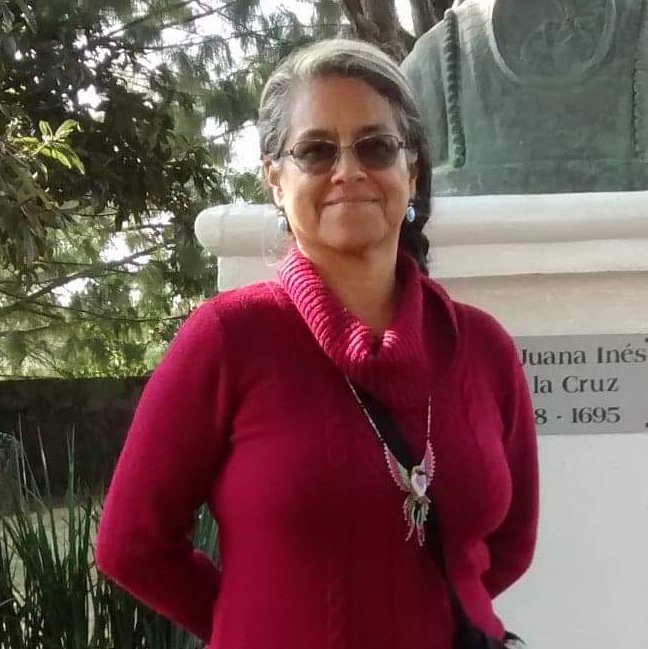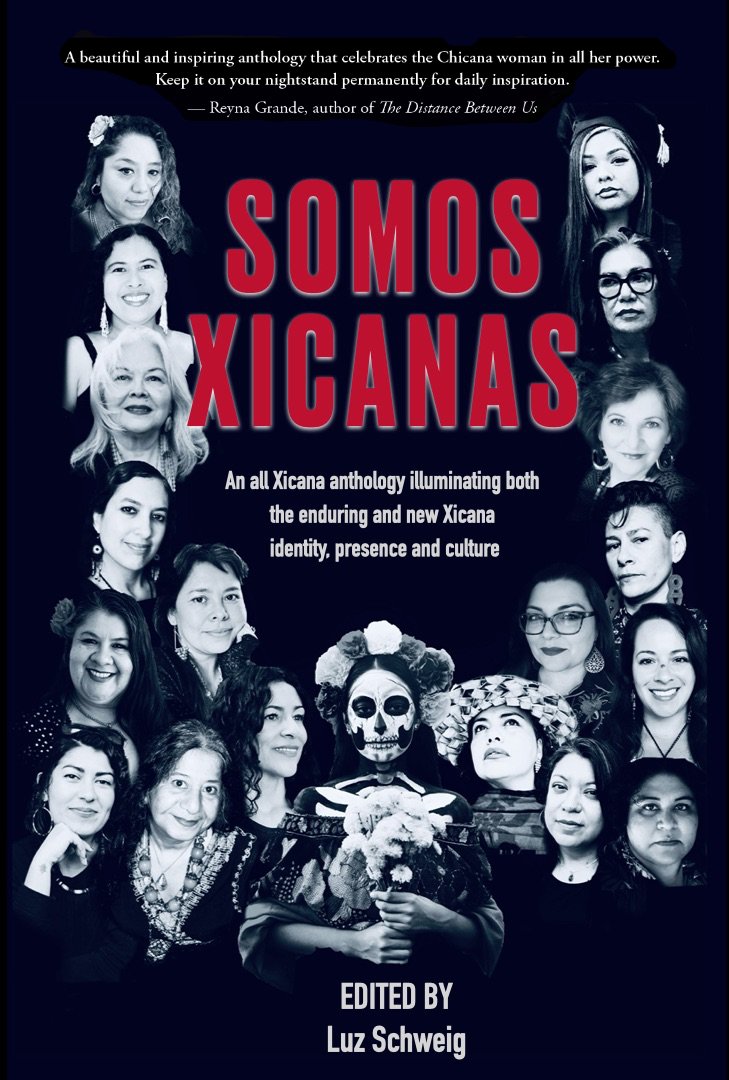Sacred Rage & Rhymes: How Xicana Poetry is Fueling Resistance Against Erasure
Illustration by Roxsy Lin for palabra
Latinas are channeling fury into verse — unleashing a movement of unapologetic truth.
For people who did not vote for the current occupant of the White House, there are lots of reasons to be angry these days. The administration is helming a fight against Diversity, Equity, and Inclusion, which, among other things, led to the elimination of the Latin Cultural Club and the Society for Hispanic Professional Engineers at the U.S. Military Academy at West Point soon after Donald Trump was sworn in. And even if you did not go to West Point or aren’t remotely associated with it, the erasure of one is the erasure of us all.
In March, the administration began deporting hundreds of Venezuelan nationals to a maximum security prison in El Salvador, accusing the individuals of being gang members. Many have disputed the charges through their families, and thousands more are up in arms about the lack of due process under which persons were removed from the United States to a country that's not their own. And yet, the administration is dragging its feet when it comes to returning these migrants to the United States, despite court orders.
Proposed budget cuts could disproportionately affect Latinos and other groups of color, as they tend to be groups that rely more than others on government assistance. Everywhere you turn, it seems as if Hispanics are being targeted by the Trump administration.
Perhaps without really intending to, a group of Latinas has found an unlikely way to voice their rage: poetry. They came together via “Somos Xicanas,” a collection of 130 poems and essays published in December by Riot of Roses, a Xicana-owned small press based in Los Angeles. These mujeres are gathering in poetry readings all over the country, grabbing microphones and speaking their truths — many times painful, others beautiful, always uncompromising. Anger “it's a thread that's running through it,” said Brenda Vaca, Riot of Roses Publishing House founder. “Poetry writing is sacred and is a humanizing way to express our rage. I have a lot of rage and there's so much to be angry about, and terrified of. It's a good way to funnel it.”
Like a wildfire, rage can clear the way for something beautiful, Vaca continued. “Some of the stereotypes (about Latinas) need to be destroyed in our society. We're in a rebuilding phase. It's painful, but it can be a painful and beautiful experience,” she told palabra.
My sacred rage runs through these veins
My sacred rage discards these chains
“Ode to the Resurrection of Mayahuel” Brenda Vaca. “Somos Xicanas.”
Riot of Roses Publishing House founder Brenda Vaca. Photo courtesy of Brenda Vaca
Rage is only one of the many currents running through the book. There's the clear and unmistakable reclaiming of indigenismo, a recapture of an indigenous past that has always been part of the Chicano movement but feels supercharged. There is the redefinition of what it means to be Chicana, in this country of course, because the term does not exist outside of it. And there's the word itself: Xicana, a very intentional re-spelling of the term itself.
Support the voices of independent journalists.
|
“In the title of this book, I have chosen to use the 'X' spelling of 'Xicana' as a way to emphasize a wellness that results from cultivating connections with each other, the natural world, and our ancestral roots,” editor Luz Schweig writes in the introduction. “The 'X' symbolically harkens back to Indigenous times, before the Spanish invasion, before our human right to wellness was turned into a privilege for which we had to fight. Personally, the X reminds me of the ancient Xochimilca people known for their ability to make chinampa (lake beds) gardens flourish, under the leadership of female tlahtoani (leaders).”
Schweig found poetry as a way to heal the wound of dislocation she felt when she moved to the United States. Living in Mexico City, she arrived in California when she was 13 and felt very disconnected. Had she found a collection like “Somos Xicanas,” perhaps life would have turned differently for her.
"Somos Xicanas," a poetry and essay anthology by Latinas, published by Riot of Roses. Photo courtesy of Riot of Roses
“My hope is that the powerful Xicana voices in this book crack someone's pavement and release the rivers trapped underneath,” she writes. “Like the mighty river Huitzilopocho waiting to be freed — whose waters once flowed where Avenida Río Churubusco now lays, just around the corner from my own childhood neighborhood — there are many voices just waiting to be liberated.”
Perhaps that's another reason why “Somos Xicanas” reading feels so powerful. They are liberating. Women, many of us of a certain age, coming together to be seen just like we are: dark skinned, opinionated, proud of our skin tones and our ancestral past. Three of my own poems are included in the collection, and it's been a real treat to share the stage with two poet laureates – Victoria Bañales, Watsonville Poet Laureate, and Aideed Medina, Fresno Poet Laureate, both in California. The collection also includes poetry luminaries such as U.S. Poet Laureate Ada Limón and Lorna Dee Cervantes, considered one of the most important voices in Chicana poetry.
A March 29 reading of "Somos Xicanas" with contributing poets at La Plaza de Cultura y Artes in Los Angeles. From left: Victoria Bañales, Melinda Palacio, Rosanna Álvarez, Jesenia Chávez, Lorna Dee Cervantes, Brenda Vaca, Inez González Perezchica, Aideed Medina, Angelina Sánez, Dahlia Aguilar, and Claudia Meléndez Salinas. Photo courtesy of Victoria Bañales
Perhaps it's because, supported by the embrace of your hermanas in poetry and supported by an audience who is sympathetic to the message, it's OK to be angry. It's OK to experience rage.
“Anger can be a motivating force,” Schweig told palabra. “Unlike depression, which can lead to stagnation, anger is invigorating. It leads to movement, it leads to action. I think this is part of what I'm feeling with the poetry that came in and the way it's being delivered. It's delivered in the spirit of activism.”
Activism was always an integral element of the Chicano movement, something that remains even after more than 60 years.
“This is cultural production and culture is synonymous with presence, with not allowing erasure,” Schweig adds. “We are not invisible. We've never been invisible, and especially this government that's trying to revert to where we were 50 years ago. This is a very spirited and fiery community. We are here, our presence is strong, we will not be silenced. This is what a movement is, and it's inspiring everyone, even outside of the anthology.”
—
Claudia Meléndez Salinas is an author, journalist, open water swimmer, and a big cat lover. @MelendezSalinas
Roxsy Lin is an illustrator and journalist originally from Venezuela. Her work emphasizes themes of diversity, mental health, and cultural identity. She is passionate about creating artworks that showcase the rich tapestry of experiences within the BIPOC community, aiming to foster understanding and connection through her creative expressions. @roxsy_lin
Patricia Guadalupe, raised in Puerto Rico, is a bilingual multimedia journalist based in Washington, D.C., and is the interim managing editor of palabra. She has been covering the capital for both English- and Spanish-language media outlets since the mid-1990s and previously worked as a reporter in New York City. She’s been an editor at Hispanic Link News Service, a reporter at WTOP Radio (CBS Washington affiliate), a contributing reporter for CBS Radio network, and has written for NBC News.com and Latino Magazine, among others. She is a graduate of Michigan State University and has a Master’s degree from the Graduate School of Political Management at George Washington University. She is the former president of the Washington, D.C., chapter of NAHJ and is an adjunct professor at American University in the nation’s capital and the Washington semester program of Florida International University. @PatriciagDC










